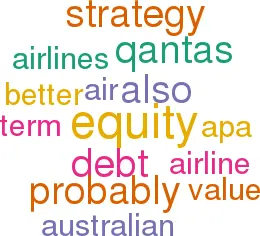Finance learns patience
December 2006


The availability of both debt and equity finance, and financiers' voracious appetite for aviation–related businesses, is making for some very interesting speculation. M&A rumours abound, with some proponents evidently oblivious to the consolidation analysis ("Myth and reality") published in the previous issue of Aviation Strategy.
Various combinations of the US Legacy carriers have been proposed, though the only definite proposal so far is US Airways' bid for Delta, which is being strongly opposed by Delta’s management and is unlikely to progress further unless the Chapter 11 creditors' committee at the airline persuades the Bankruptcy Court that a US–DL airline is a better bet that than Delta’s stand–alone plan, which does look to contain some very optimistic forecasts.
In Europe the Italian government is becoming increasingly desperate in its attempts to find an airline owner for its flag–carrier. But Air France/KLM is subject to the discipline of the equity market, which generally hates the idea of putting money into Alitalia. With Alitalia a non–starter, Iberia has been linked not only with BA but also with Air France and with Lufthansa — though the network synergy arguments are totally unconvincing. For tactical reasons — the best rationale for M&A — consolidation is likely in the German charter and LCC sector; Air Berlin (incorporating dba) now has 60 737–800s to add to its 50 A320 orderbook, and probably has to buy into new markets.
The biggest financial takeover — possibly since Al Checchi’s LBO of Northwest Airlines in 1989 — is in Australia where a Private Equity consortium, APA which includes Texas Pacific Group and Macquarie Bank, have had their Aus$11bn offer for Qantas accepted by the airline’s Board. The Aus$11bn (US$8.7bn) purchase price, 60% above the stock–market capitalisation of Qantas pre–bid, consists of approximately Aus$3.6bn in equity and Aus$7.5bn in debt.
"Patient capital" is the term being used by the APA investors, which means probably that they are taking a longer term view of the airline’s value to that of the stock–market, which is driven by short–term factors. The debt leverage is wonderful for the equity investors if their strategy succeeds (and in the short term, in cashflow terms, the additional interest payment from the new debt are probably equalised by not having to pay corporate taxes or dividends), but painful if the strategy fails and/or market competition intensifies. The key question, however, is how the APA consortium will add value to Qantas, given that no significant changes will apparently be made to the current strategy or to the top management.
Some ideas include:
- Negotiating better lease and purchase prices from the manufacturers (currently 70 A380s, 787s 737s and A330s) — probably marginal gains;
- Negotiating better airport charges — raises major competitive issues given Macquarie's' ownership of Sydney Airport;
- Driving down labour costs — Australia’s stroppy unions make this difficult;
- Exploiting the Jetstar operation, using Texas Pacific’s LCC experience with Ryanair and also Continental — again the downside is Australian labour opposition and also VirginBlue, which is set to start competing on the transpacific;
- Lobbying the Australian Government to open up Qantas to greater than 49% Australian ownership, and hence increase its value, which is feasible but which would also imply more international liberalisation and intensified competition from Emirates and others.